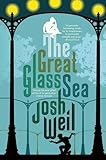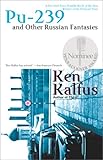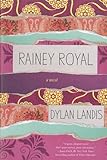For me the best, most moving, overwhelming novel of the year was Hungarian-American Les Plesko’s No Stopping Train. Lyrical in style, tough in mood, enigmatic and structured through series of interlocking love triangles, it spans the end of WWII to the crushing of the Hungarian Revolution in 1956. Its publication comes tragically on the heels of Plesko’s death by suicide in 2013.


 No Stopping Train propelled me headlong into a series of Eastern works, old and new. Nobelist Imre Kertesz’s Liquidation was the perfect follow-up, a bracing, formally inventive short novel of love and betrayal among the literati in the 1980’s in Hungary, treating many of the issues of Plesko’s book. Then I reread Sergei Dovlatov’s The Suitcase, a collection of breathtakingly funny and poignant Russian short stories which consider the provenance of eight objects he brought to America in the 1980s — rather the way Primo Levi wrote on the elements in The Periodic Table.
No Stopping Train propelled me headlong into a series of Eastern works, old and new. Nobelist Imre Kertesz’s Liquidation was the perfect follow-up, a bracing, formally inventive short novel of love and betrayal among the literati in the 1980’s in Hungary, treating many of the issues of Plesko’s book. Then I reread Sergei Dovlatov’s The Suitcase, a collection of breathtakingly funny and poignant Russian short stories which consider the provenance of eight objects he brought to America in the 1980s — rather the way Primo Levi wrote on the elements in The Periodic Table.
 Looking around for something big to plunge into, I found American author Josh Weil’s first novel, The Great Glass Sea, an elegant, lush work set in a slightly alternative-future Russia, about separated twins — one, a “New Russian,” trying to get ahead in the capitalist system; the other, whom you might see as “the Russian soul” just wanting to get back to the land and reunite with his brother — in a land dominated by a corporation using sky-mirrors and enormous glass greenhouses to eliminate the night. Weil is a gorgeous writer on the sentence level, and creates the feel of myth and perfectly captures the texture of Russian thought.
Looking around for something big to plunge into, I found American author Josh Weil’s first novel, The Great Glass Sea, an elegant, lush work set in a slightly alternative-future Russia, about separated twins — one, a “New Russian,” trying to get ahead in the capitalist system; the other, whom you might see as “the Russian soul” just wanting to get back to the land and reunite with his brother — in a land dominated by a corporation using sky-mirrors and enormous glass greenhouses to eliminate the night. Weil is a gorgeous writer on the sentence level, and creates the feel of myth and perfectly captures the texture of Russian thought.
 More Russia please. American Ken Kalfus’s short story collection Pu-239 and Other Russian Fantasies fit the bill. My favorite stories were the title one, concerning a nuclear disaster with Chernobyl overtones, and the last one, “Peredelkino,” in which a member of the official Soviet literati straddles the fence between collaboration and independence, while his wife, the ultimate reader, retreats to their treasured dacha in the writer’s village best known as the home of Boris Pasternak and Anna Akhmatova in later years. This and Liquidation spoke to each other in my reader’s consciousness in the most serendipitous, exciting way.
More Russia please. American Ken Kalfus’s short story collection Pu-239 and Other Russian Fantasies fit the bill. My favorite stories were the title one, concerning a nuclear disaster with Chernobyl overtones, and the last one, “Peredelkino,” in which a member of the official Soviet literati straddles the fence between collaboration and independence, while his wife, the ultimate reader, retreats to their treasured dacha in the writer’s village best known as the home of Boris Pasternak and Anna Akhmatova in later years. This and Liquidation spoke to each other in my reader’s consciousness in the most serendipitous, exciting way.
I admit to being the last person in America to read Denis Johnson, but I knew Les Plesko admired him. After the Josh Weil book, I craved another big one, so started with a book you don’t hear much about, Already Dead, a love song to the northern coast of California, and discovered a lush, populous, intricate work I could not stop reading — a suspenseful, landscape-rich, emotionally accurate and often dead funny novel.
 Now I was ready for contemporary novels. Three of them brought it home. Dylan Landis’s edgy short novel-in-stories Rainey Royal had me jumping out of my seat. I knew girls like Rainey in school — beautiful, bohemian, seductive yet dangerously unpredictable, your best friend one minute and then, a straight razor slashing you to bits. But who were they from their own point of view? Landis shows us — in tight, brilliantly faceted language — in a 1970’s New York that had resonances with The Flamethrowers.
Now I was ready for contemporary novels. Three of them brought it home. Dylan Landis’s edgy short novel-in-stories Rainey Royal had me jumping out of my seat. I knew girls like Rainey in school — beautiful, bohemian, seductive yet dangerously unpredictable, your best friend one minute and then, a straight razor slashing you to bits. But who were they from their own point of view? Landis shows us — in tight, brilliantly faceted language — in a 1970’s New York that had resonances with The Flamethrowers.
Nayomi Munaweera’s gemlike novel of the Sri Lankan civil war, Island of a Thousand Mirrors, I would best describe as a “mini-epic.” The short intense novel took me deep into the life of that island nation through its girls on both sides of the conflict, daughters of intertwined families and their histories ties, which are then torn apart by the worst of all possible wars. Everyone’s a casualty in some way, even those who seem to have escaped. Deservedly shortlisted for the Man Asia prize.
Lastly, a book which practically vibrated off my bedside table for the beauty of its language and the intensity of its story was Ruby by Cynthia Bond. A girl returns for New York City to her hometown, the all-black township of Liberty, Texas, only to be undone by the restless spirits of the past. Powerful and hard to shake, it lost nothing by its thematic resonances with Toni Morrison’s haunted Beloved, as well as its streak of humor in the depiction of its small-town yokels, which reminded me of later William Faulkner. I love a book that tears me to shreds — and, on the sentence level, soars to the heavens.
More from A Year in Reading 2014
Don’t miss: A Year in Reading 2013, 2012, 2011, 2010, 2009, 2008, 2007, 2006, 2005
The good stuff: The Millions’ Notable articles
The motherlode: The Millions’ Books and Reviews
Like what you see? Learn about 5 insanely easy ways to Support The Millions, and follow The Millions on Twitter, Facebook, Tumblr.









